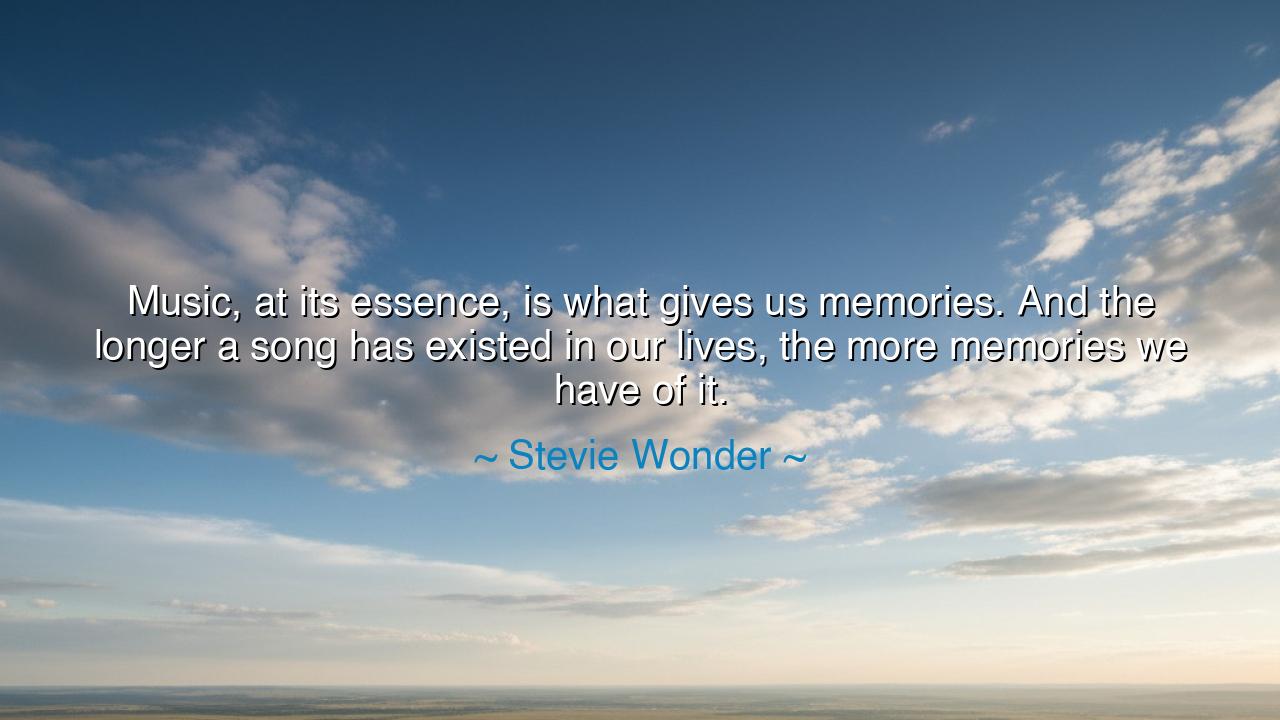
Music, at its essence, is what gives us memories. And the longer
Music, at its essence, is what gives us memories. And the longer a song has existed in our lives, the more memories we have of it.






“Music, at its essence, is what gives us memories. And the longer a song has existed in our lives, the more memories we have of it.” So spoke Stevie Wonder, the prophet of soul whose voice carried both joy and longing into the hearts of millions. His words reveal the hidden mystery of music—that it is not only sound, but a vessel of time, a keeper of memory, a bridge between the past and the present. A melody does more than move the body—it awakens the soul, reminding us of moments we thought forgotten, carrying us back to places long gone, yet alive once more in song.
The ancients too understood this sacred power. In every culture, songs were sung not merely for delight but to remember—to carry the stories of ancestors, the victories of warriors, the sorrows of the exiled, and the triumphs of the free. Before men carved their histories into stone, they wove them into melodies. In this way, music became the first memory-keeper, stronger than ink, for it lived not on paper but in the hearts of the people, passed from mouth to ear, from generation to generation.
Stevie Wonder himself, though blind from infancy, lived this truth deeply. Though his eyes could not behold the world, music became the gallery of his memory. His songs are filled with this spirit—“I Just Called to Say I Love You,” “Superstition,” “Isn’t She Lovely.” For those who hear them, they are not only melodies but markers of time. A wedding, a summer evening, a heartbreak, a celebration—these moments cling to the song like perfume lingers on a garment. And the longer the song endures in our lives, the richer it becomes with memory, until it is no longer just a song but a tapestry of living history.
History itself offers us great examples. Think of “Auld Lang Syne,” a song sung across the world at the turning of the year. For some, it recalls youth; for others, partings and reunions; for others still, it brings the memory of loved ones gone. Though simple, its music carries the weight of centuries of human longing for remembrance and connection. Or consider the Negro spirituals sung by enslaved people in America—songs like “Swing Low, Sweet Chariot” or “Go Down, Moses.” These were not only prayers of survival, but memory-keepers of pain, faith, and the hope of freedom. Each note was a monument that no oppressor could erase.
The lesson of Stevie Wonder’s words is profound: treat music as sacred, for it carries your life within it. Songs are more than background noise; they are mirrors of your soul’s journey. What you listen to becomes part of your memory, and what becomes memory becomes part of your being. To fill your life with beautiful music is to weave a beautiful tapestry of remembrance, a songbook that will one day remind you who you were and who you have become.
O children of tomorrow, take heed: when a melody touches your heart, cherish it, for it may one day carry you back to the people and places you hold dear. Share songs with those you love, for in time, they will not only remember the song but the bond they had with you. Do not dismiss music as fleeting—it is among the most lasting gifts you can give. For when all else fades, a song can still awaken laughter, tears, and hope.
In practice, let this mean that you live attentively with music. Choose songs not only to fill silence but to mark your moments—your triumphs, your grief, your milestones. Let each song become a stone upon the path of your life, so that when you look back, the melody will guide you through memory. And when you pass on, those songs may remain in the hearts of others, carrying your spirit forward.
Thus Stevie Wonder’s words endure: music gives us memories, and the longer it stays with us, the richer those memories become. Treat every song as both a present joy and a future remembrance, for in music lies the power to carry your story across time itself.






AAdministratorAdministrator
Welcome, honored guests. Please leave a comment, we will respond soon